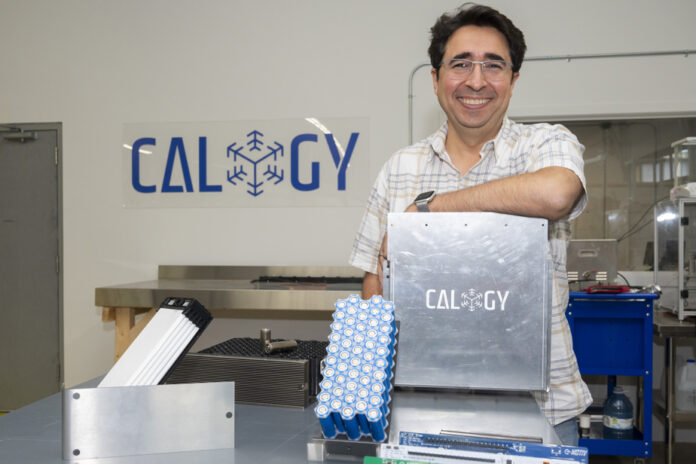Calogy Solutions designs and manufactures batteries as well as thermal management components for batteries, two products with strong potential in aerospace. With its new plant, which will open within two years, the Sherbrooke company could double the number of its employees.
Last March, Calogy Solutions announced the purchase of land in the Sherbrooke regional industrial park in order to build its first manufacturing plant. The project is progressing at a good pace.
“We are currently finalizing the architectural plans. We will start construction in 2024. We should move there in 2025,” says CEO and co-founder Mahmood Shirazy. Designed to accommodate around 50 employees, the building will eventually be able to support annual production of 1 million thermal units per year, and 3,000 to 5,000 battery modules.
Incorporated in 2017, the company really started doing business in 2020. Since then, it has worked with various clients such as Safran, Unither Bioelectronics and Bell Textron.
What sets it apart from other battery manufacturers is its thermal management modules, which allow you to adjust the temperature of the batteries. That’s because lithium-ion batteries work best in temperatures ranging from 15℃ to 25℃, explains the CEO.
“Hotter, the battery ages prematurely or may catch fire,” he says. Colder, its performance is reduced. »
Mahmood Shirazy sees a number of potential avenues for his company’s batteries in the aerospace industry.
The first is 100% electric aircraft. As lithium-ion batteries still have relatively low energy density, these are mainly vertical takeoff and landing aircraft that can serve as air taxis and cover short distances.
The second is that of aircraft using two energy sources. We can think of aircraft using hydrogen and batteries, for example, but also of hybrid aircraft that would use traditional turbines coupled with electric propulsion for landings and take-offs.
This is because traditional gas turbines are very efficient at constant speed, in “cruise” mode, explains the CEO. But they waste a lot of energy during takeoff and landing, unlike electric motors.
“Some companies are currently developing hybrid engines and our batteries would be very suitable for this type of application. »
Mahmood Shirazy recognizes that fully electric aircraft engines would not completely solve the problem of CO2 emissions linked to air transport: electricity production is not necessarily clean everywhere in the world.
However, they would help stem another problem caused by traditional turbines: that of air pollution.
While waiting for its new factory, Calogy Solutions has its work cut out for it. Last July, Ottawa announced $1.4 million in financial support through Canada Economic Development (CED). Amounts that will help it to develop further.
“The amount was used to create 16 jobs, bringing the total to 20, and will help our engineering team to develop our technology further,” says Mahmood Shirazy.















